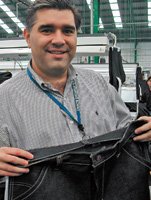Guatemala Prepares for 2005
GUATEMALA CITY, Guatemala—Central American apparel manufacturers are ramping up their production and full-package capabilities to meet anticipated demand even though it is uncertain whether the Central American Free Trade Agreement will be approved this year.
Guatemalan President Oscar Berger—who opened the 13th annual Apparel Sourcing Show, held May 5–7 at the Grand Tikal Futura Convention Center in Guatemala City—said he traveled recently to Washington, D.C., with other Central American heads of state to speak with President George Bush about CAFTA. “President Bush said he is going to sign CAFTA, but he doesn’t know when he will submit it to Congress,” said Berger, who took office in January and vowed to support the apparel and textile industries.
According to Berger, Bush is uncertain whether he has enough congressional votes to pass the freetrade accord, which has come under increased scrutiny this election year because it would send jobs overseas. At the earliest, Bush could sign the complete agreement, including the later admission of the Dominican Republic, on June 24.
Meanwhile, Central America stands to benefit from the fact that China and other Asian manufacturers are expected to use up their 2004 U.S. quotas by June or July. In Guatemala alone, apparel orders from U.S. apparel manufacturers and retailers are expected to increase by 10 percent this year because of the Chinese quota shortage, noted Carla Caballeros, manager of Vestex, the Guatemalan apparel and textile exporters’ union.
That increase in production has been seen by companies such as Polar Industrial S.A., a 6-yearold Guatemalan business that makes childrenswear, athleticwear, polo shirts and underwear for retailers including Babies R Us, Carter’s and Galyan’s.
“This year, our production is up 8 percent year-to-date, and we expect that to increase when quotas become more difficult this year,” said John Peden, one of the founders of Polar Industrial. “We expect production to go up 10 to 15 percent with CAFTA.”
The same has been true for Shin Won Guatemala S.A., a 7-year-old Guatemalan manufacturer that makes T-shirts and knit tops for Wal-Mart Stores Inc., Gap Inc., Target Corp. and Old Navy Inc. Last year, the company, which employs 2,800 people, exported $94 million worth of goods to the United States. This year, that figure is expected to increase to $100 million or more, said Tony Kang, the company’s president.
“Some of that business is coming from things that used to go to Vietnam,” Kang said inside his office on the company’s second floor, which overlooks the plant’s 38 production lines.
New opportunities
If CAFTA doesn’t pass this year, the next best guess is that it will pass in the first half of 2005. The accord is deemed essential for Central American manufacturers to compete with China and other Asian countries that belong to the World Trade Organization. WTO members will see quotas disappear on apparel and textiles entering the United States on Jan. 1, 2005.
U.S. businesses seem optimistic that CAFTA will be in place, either this year or next. They are eyeing Central America as a new opportunity to expand in apparel and textiles.
One of those looking at the region is Wilbur Ross, the contrarian who purchased bankrupt Burlington Industries Inc. for $614 million last year and bankrupt Cone Mills Corp. for $90 million earlier this year. Ross was scheduled to visit Guatemala the week of May 10 to examine the feasibility of setting up a denim mill to supply factories such as Koramsa, the behemoth Guatemalan blue jeans manufacturer that currently makes 500,000 pairs of blue jeans a week for mostly Levi Strauss & Co. and Gap Inc., said Alvaro Ruiz, Koramsa’s president. The company will increase its production capability to 700,000 pairs of jeans a week by August.
Ross is not the only person taking a fresh look at Guatemala. Several smaller apparel companies are starting to think that Central America will become the equivalent of the old South, which used to have scores of apparel manufacturers before those businesses left the United States and went overseas.
Brian Zinati, vice president of production and sales at the J.R.B. Collection Inc., a Los Angeles manufacturer of childrenswear and womenswear, made his first visit to the Apparel Sourcing Show, a three-day event that allows U.S. and Central American businesses to take advantage of the Caribbean Basin Trade Partnership Act. CBTPA was passed in 2000 and allows goods made in Central America with U.S. yarns or textiles to return to the United States duty- and quota-free. Knitwear made of Central American fabric is also given quota- and tarifffree status as long as it uses U.S. yarns. CAFTA, with its more liberal rules, would replace CBTPA.
That why the J.R.B. Collection, a 17-year-old company with annual revenues of $3 million, is considering Guatemala. The manufacturer currently does 40 percent to 45 percent of its production in Los An geles and the rest in Asia.
“I would like to expand and manufacture in different places,” said Zinati, who planned to visit one or two factories during his visit. “I think there is a lot of opportunity here. CAFTA is one of the main reasons we are here.”
Also taking a look at the country was Frank Yi of Dream Castle, a small Los Angeles childrenswear manufacturer that does 80 percent of its production in Southern California and 20 percent in China. He too was visiting factories to see if he could diversify his manufacturing options.
Zinati and Yi were among the 5,110 people who attended the apparel sourcing show. Attendance rose 7 percent from last year.
Critical CAFTA
Those U.S. companies that recently jumped into the Central American market, betting that CAFTA would be in place by now, said passage of CAFTA is essential.
At the show, representatives from Twin Dragons Marketing Inc., based in Gardena, Calif., tried to sell goods from the company’s joint venture textile plant, Alpha Textiles, which opened last year outside Managua, Nicaragua. The company does piece-dyed twills, canvas and stretch fabric for pants. “I think people are going to be hurt real bad if CAFTA doesn’t go through,” said Bo Dean, the company’s senior vice president of sales and marketing.
Alpha Textiles is promoting its stock of unfinished fabric that can be dyed in two weeks and delivered five weeks later. “Without fast turn, we’re not going to be competitive with Asia,” Dean said.
Gearing up for speed and service
The buzzwords among Central American apparel manufacturers are “full-package deals” and “speed to market.” Without these, the manufacturers believe they will have no edge over their Asian competitors, who have embraced the concept of full packaging and manufacture goods at half the cost.
Koramsa, Guatemala’s largest manufacturer, located on a sprawling campus the size of a small city, entered the full-package market in 1998, when the company received its first full-package order from Old Navy for 30,000 pairs of boys’ twill pants. “We realized that full package was key and that retailers needed to establish a relationship with factories,” said Ruiz, who has been the company’s president since 2001.
But the full-package concept turned out to be a nightmare. The main problem was making the entire system work, from manufacturing to distribution to financing and credit. “People in the back office of the U.S. mills didn’t know we existed. We couldn’t even get our telephone calls returned,” recalled Carlos Arias, the company’s executive vice president.
Consequently, Koramsa suspended its money-losing full-package program in 2000. “If everything went right, we would lose $300,000 on a $2 million order,” Arias said.
Koramsa reorganized its supply chain and restarted its full-package offering in 2001.
Now, speed to market is key—as is providing services that were not offered before.
Last year, Koramsa purchased 60 industrialsized washing machines, at an average cost of $60,000 each, to do blue jean washes. The company is augmenting its capacity to sandblast blue jeans, giving the pants that special vintage look, from 100,000 pairs to 150,000 pairs a week.
And at its new 400,000-square-foot El Naranjo campus 10 minutes away from the main headquarters in Guatemala City, Koramsa will be doing much of its pre-design work, from pattern-making to garment cutting.
Next door, Shore to Shore Inc., a Miamisburg, Ohio–based company that makes labels and pocket flashers, is building a new structure that will be running by October. Once the new facility opens, Koramsa will not have to wait five weeks for paper trim to arrive.
“In three years,” Arias said, “it’s been like flipping a coin.”
























